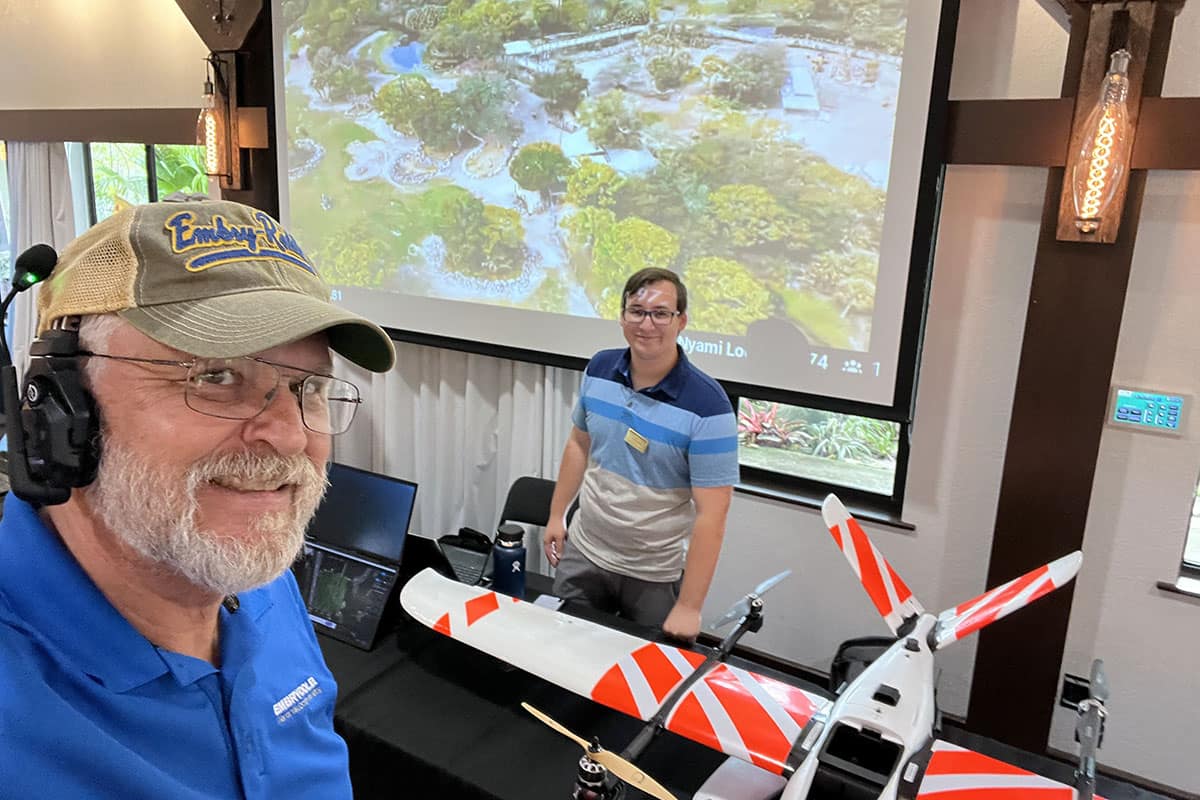For the past six years, Dr. Nickolas “Dan” Macchiarella has often been found at the Brevard Zoo in Melbourne, Florida. A professor at Embry‑Riddle’s Daytona Beach Campus in the College of Aviation, he is more than just an enthusiast of the zoo and its inhabitants. He and his students — Tyler Deal, Sean Nolan, Nicholas Buckalew and David Zink — are providing critical data in support of the environment, as well as educating the zoo’s guests in support of COASTech — a consortium between the Brevard Zoo, academia and corporations — to conduct both research on and education about the coastal environments of Florida.
According to Macchiarella, whose expertise focuses on the application of sensors on uncrewed aircraft systems (UAS), or drones, “One of the best aspects of our work with COASTech and the Brevard Zoo is that our students are the pilots: collecting, processing and providing data to other team members. They gain real-world knowledge while doing meaningful work.”
Formerly known as the Turtle Tech Project, COASTech is highlighted during Science Sundays, an initiative taking place throughout the months of July and August. The event is designed to blend education and entertainment in an effort to foster a love of science among guests of all ages. During Science Sundays, children and guests are invited to participate in hands-on activities led by experts such as Macchiarella and Dr. John Robbins, chair of the Aeronautical Science Department in Embry‑Riddle’s Daytona Beach Campus College of Aviation, along with a dedicated group of students.
Brian Ogle, Ed.D., director of Conservation Learning and Audience Impact at the Brevard Zoo, shared his excitement about the summer events to engage zoo guests in STEM learning during their visits.
“It has been a privilege to collaborate with our STEM partners in applied research and STEM education opportunities,” he said. “Partners like Embry‑Riddle make it possible to provide real-world learning moments at the zoo. We look forward to creating even more unique opportunities in collaboration with our STEM partners in the future.”
“Working on projects with COASTech and the Brevard Zoo has been pivotal in shaping my education and future career plans,” added Nicholas Buckalew, a master’s student in Embry‑Riddle’s Uncrewed and Autonomous Systems program and a UAS payload specialist. “These hands-on experiences have provided valuable insights into the intersection of technology, conservation and community engagement.”
Brevard Zoo guests learn from Embry‑Riddle students Sean Nolan and Tyler Deal at the Science Sunday event. (Photo: Dan Macchiarella)
Fellow COASTech participant David Zink, a senior majoring in UAS, shared that the ability to explore the various applications of UAS, especially ones that help environmental conservation, makes his degree program truly unique.
“It’s also quite rewarding to see the joy on people’s faces when they see these aircraft in action, knowing we’re using this technology to help the environment,” Zink said.
Macchiarella and his students dedicate much of their time and work to the Indian River Lagoon basin, flying uncrewed aerial vehicles (UAVs) carrying visible light and multispectral cameras. “As we monitor the basin, we also use artificial intelligence (AI) technology to search images for the subjects of interest — for example, sea turtles.”
According to Tyler Deal, a College of Aviation senior majoring in UAS, “COASTech has been a great project that allows me to use what I have learned in my degree program in a way that benefits the environment. It has provided me with many opportunities for community outreach and has led to other environmentally focused projects around Cape Canaveral. The experience has even provided opportunities as far away as Argentina.”
Macchiarella, who is a member of the Indian River Lagoon Council STEM Advisory Committee, along with his student team, participates in two additional projects in support of the environment in central Florida. One of those projects is funded by a National Science Foundation grant in conjunction with Stetson University and the City of Cape Canaveral, where the team has established aerial monitoring at the Veterans Memorial Park to identify green stormwater-infrastructure-based interventions for climate and water quality mitigation.
The other, a National Oceanic and Atmospheric Association Sea Grant in conjunction with Stetson University, supports the East Central Florida Regional Planning Council’s Regional Resiliency Action Plan, emphasizing the importance of green infrastructure in mitigating flood risks and protecting water quality in the Indian River Lagoon watershed.
“Not only are we able to contribute positively to the land and the environment through our love of aviation and UAVs, [but] I’m able to work directly with the next generation in the workforce, and the upcoming generation of students, to inspire them to make the planet a healthy and sustainable place for generations to come,” Macchiarella said.
It doesn’t get any better than that.
Discover more from sUAS News
Subscribe to get the latest posts sent to your email.

